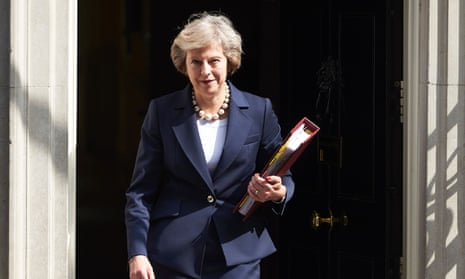Theresa May should use her first 100 days as Britain’s second female prime minister to make radical changes for women’s rights, including a commitment to a gender balanced parliament and universal childcare, the Women’s Equality party has said.
Launching its 100 days of May campaign, the party’s leader, Sophie Walker, said the new PM was being asked to make six commitments to advance equal opportunities for women and girls, from domestic violence funding to sex education.
Walker said having a female prime minister did not mean the end of the toxic climate around many women standing for political positions across all parties.
“The Tory leadership contest between Theresa May and Andrea Leadsom was an almost exact re-run of the way Yvette Cooper and Liz Kendall were pitted against each other, on the basis of who has children and who doesn’t,” she said. “This gaming of women has got to stop.”
Walker called Angela Eagle’s departure from the Labour leadership contest “enormously disappointing” and said the speed with which the parliamentary party rallied behind a male candidate to take on Jeremy Corbyn “shows that Labour really does have a women problem”.
The Women’s Equality party, which stood candidates in Glasgow, Lothian, South Wales Central and London in elections this year, has radically overhauled normal party procedures for selecting candidates, Walker said, including giving them help with childcare, bursaries for low income candidates and training to deal with public profile. “That is how you do this, that is how you encourage women,” she said.
“We had people coming to us from the most amazingly diverse backgrounds, people who had been street homeless, 30% from minority backgrounds, 30% LGBT+, we stood a really strong and diverse list of women, who came out of that experience raring to do it again. It is possible and a core part of this party.”
The feminist party will ask the government to commit to sustainable funding specialist services for female victims of sexual assault or abuse, universal childcare from the end of parental leave, compulsory sex education in schools, ratifying the Istanbul convention on tackling domestic violence and ending the detention of female asylum seekers.
Walker said she also saw May’s rise to the top as a way to increase the numbers of women in politics, despite only a minor improvement in the number of women in the cabinet compared with David Cameron’s team. “There is such an opportunity here, with all the talk of a new prime minister, who has a real understanding of women’s experiences in Britain, who has real experience working with women to bring them up the ranks of the Conservative party,” she said.
“A 50/50 parliament would be a huge shift in how we create laws in this country to reflect it. It could be done within two elections if 66% of new MPs and 75% of new peers were women. And then it is done.”
The prime minister has been praised for parts of her record as home secretary, where she passed a law against coercive control in relationships and held a nationwide inquiry by Her Majesty’s Inspectorate of Constabulary into the treatment of domestic violence victims by police. Critics point out, however, that May has been far less concerned about the treatment of migrant women, refusing to end the detention of pregnant women in Yarl’s Wood.
Walker said an independent inquiry was also needed into allegations of abuse at the detention centre, after its operator, Serco, concluded that it did not have an endemic culture of abuse.
The six proposals have not been costed, and Walker told the Guardian she would like in the first instance to see government departments review their spending commitments in the areas mentioned.
Last year, the government announced a £3.2m fund to boost the provision of women’s services but Walker said the levels and the allocation needed to be reviewed by the Home Office.
The current commissioning model for domestic violence services and rape crisis centres, she said, “favours the large generic companies that can provide a cheaper offer, not the specialist support. We need an holistic model which actively supports smaller specialists, like centres for BME or disabled women.”
The Women’s Equality party’s call for universal childcare, which would provide 15 hours free a week after the end of statutory parental leave and £1 an hour thereafter, would be a radical increase in the government’s current proposal to increase state support for three and four-year-olds from 2017.
Walker cited a report by the Joseph Rowntree Foundation last week which found childcare had “become the one of the biggest barriers to reaching a decent living standard”.
One key area that Walker is particularly hopeful to see change is sex and relationship education in state-funded schools, which the party says should be mandatory, taught by specialists, and include information on consent and controlling relationships.
In February, Downing Street blocked a move to make sex education compulsory in all schools and Michael Gove, the former education and justice secretary, is said to have been particularly opposed to the requirement but he has now left the government.
“There is a real opportunity here to move on this now,” Walker said.
